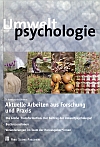Artikeldetails
 Martin Lüdemann & Heinrich Strößenreuther (2018),
Martin Lüdemann & Heinrich Strößenreuther (2018),Berlin dreht sich – vom Motto zum Erfolg
Warum Berlin in zehn Jahren auf Kopenhagen-Niveau umzubauen ist und wie die Initiative Volksentscheid Fahrrad mit Deutschlands erstem Radverkehrsgesetz das hinbekommen hat.
Umweltpsychologie 22(1), 105-130.
Dieser Artikel wurde in deutsch verfasst.
| Zusammenfassung: | In Berlin ist deutschlandweit etwas Einzigartiges gelungen: Mit der zugespitzten Kampagne Volksentscheid Fahrrad für Deutschlands erstes Radverkehrsgesetz hat die Initiative in wenigen Monaten die Verkehrswende geknackt und nachhaltige Mobilität in der politischen Agenda verankert. Durch dieses Radgesetz sollen innerhalb von zehn Jahren in Berlin eine angemessene Radverkehrsinfrastruktur aufgebaut und damit CO2- und Vision-Zero-Unfalltoten-Ziele erreicht werden. Obwohl für Autofahrende damit Parkplätze und Fahrspuren wegfallen, hatte die Initiative von Anfang an fast 100 % Rückhalt in den Medien und brachte es zu mehr als 1.000 Berichten. Dieser Praxisbericht erzählt zum einen die Geschichte dieser Initiative, beschreibt den eingebetteten partizipativen Bürgergesetzgebungsprozess und den Mobilisierungsansatz, in drei Wochen 105.425 Unterschriften für dieses Gesetz zu sammeln. Zum anderen liegt ein Schwerpunkt auf der Reflexion, wie und warum diese Initiative entstand, wie sie sich organisierte und weiterentwickelte. Durch Partizipationschancen baute sie Energie auf, mit klaren Zielen konnte sie sich vervielfachen. Als kollaborativer, digital arbeitender Schwarm wirkte sie wie ein politsicher Tsunami auf eine völlig festgefahrene Verkehrswendediskussion. Von „Meripartion“ über „Holocracy“, agile Organisation, Change-Managementtechniken bis hin zu „klugem Populismus“ (wir erklären diese Begriffe später im Text) – diese Erfolgsgeschichte wollen wir erzählen. Letztlich beschreibt unser Artikel als theoretisch angereicherter Praxisbericht ein wichtiges Stück Nachhaltigkeitsgeschichte aus Sicht eines Prozessmoderators und des Initiators. |
| Schlagworte: | Aktivismus Engagement Politische Kampagnen Umweltverhalten Verkehrswende |
| Abstract: | Berlin’s Bicycle Referendum Initiative has landed a unique coup. In only a few months the campaign for Germany’s first bicycle traffic law has forced a turnaround and made sustainable mobility a fixed item on the political agenda. The goal of the new law over the coming ten years will be to install a functioning bicycle traffic infrastructure and thus help to achieve CO2 and Vision Zero targets. Although parking spaces will be lost and the number of traffic lanes for motor vehicles reduced, the initiative has received almost universal support from the media and has been the subject of over 1,000 reports. On the one hand, this practice report tells the story of the Bicycle Referendum Initiative, describing the embedded participatory citizens’ legislative process and the mobilization behind the collection of 105,425 signatures in support of the new law in 3 weeks. On the other hand, we reflect on how and why this initiative came into being, how it was organized, and how it grew and developed. Energy was accumulated by opportunities to participate, and the clear goals facilitated growth. Taking the form of a collaborative, digitally active swarm, the initiative broke like a political tsunami over the totally deadlocked discussion on traffic policy in Berlin. From “meripartion” through “holocracy”, agile organization, and change management techniques to “smart populism” (these terms are explained in the main text)—we want to explain this success story. Finally, we present with this article a theoretically enriched practice report on a major achievement in sustainability from the viewpoint of a process moderator and the initiator. |
| Keywords: | Activism Engagement Environmental Behavior Political Campaigns Traffic Policy |
Zum Inhaltsverzeichnis

